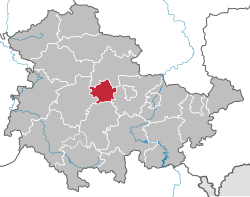
Back Erfurt Afrikaans Erfurt ALS ኤርፉርት Amharic Erfurt AN إرفورت Arabic ارفورت ARZ Erfurt AST Erfurt Aymara Erfurt Azerbaijani ارفورت AZB
This article needs additional citations for verification. (September 2023) |
Erfurt | |
|---|---|
|
clockwise: view over the city, Merchants' Bridge (Krämerbrücke) from above, Merchants' Church (Kaufmannskirche), houses on Cathedral Square (Domplatz), Cathedral Hill (Domberg) with Erfurt Cathedral (Erfurter Dom) and St Severus' Church (Severikirche), Merchants' Bridge | |
|
| |
| Coordinates: 50°58′41″N 11°01′44″E / 50.97806°N 11.02889°E | |
| Country | Germany |
| State | Thuringia |
| District | Urban district |
| Founded | 1120 |
| First mentioned | 742 |
| Subdivisions | 53 districts |
| Government | |
| • Lord mayor (2018–24) | Andreas Bausewein[1] (SPD) |
| • Governing parties | SPD / Left / Greens |
| Area | |
| • Total | 269.17 km2 (103.93 sq mi) |
| Elevation | 194 m (636 ft) |
| Population (2022-12-31)[2] | |
| • Total | 214,969 |
| • Density | 800/km2 (2,100/sq mi) |
| Time zone | UTC+01:00 (CET) |
| • Summer (DST) | UTC+02:00 (CEST) |
| Postal codes | 99084–99099 |
| Dialling codes | 0361 |
| Vehicle registration | EF |
| Website | www |
| Official name | Jewish-Medieval Heritage of Erfurt |
| Type | Cultural |
| Criteria | iv |
| Designated | 2023 |
| Reference no. | 1656 |
Erfurt (German pronunciation: [ˈɛʁfʊʁt] ⓘ)[3] is the capital and largest city of the Central German state of Thuringia. It lies in the wide valley of the River Gera, in the southern part of the Thuringian Basin, north of the Thuringian Forest, and in the middle of a line of the six largest Thuringian cities (Thüringer Städtekette), stretching from Eisenach in the west, via Gotha, Erfurt, Weimar and Jena, to Gera in the east, close to the geographic centre of Germany. Erfurt is 100 km (62 mi) south-west of Leipzig, 250 km (155 mi) north-east of Frankfurt, 300 km (186 mi) south-west of Berlin and 400 km (249 mi) north of Munich.
Erfurt's old town is one of the best preserved medieval city centres in Germany.[4] Tourist attractions include the Merchants' Bridge (Krämerbrücke), the Old Synagogue (Alte Synagoge), the oldest in Europe and a UNESCO World Heritage Site, Cathedral Hill (Domberg) with the ensemble of Erfurt Cathedral (Erfurter Dom) and St Severus' Church (Severikirche) and Petersberg Citadel (Zitadelle Petersberg), one of the largest and best preserved town fortresses in Central Europe.[5] The city's economy is based on agriculture, horticulture and microelectronics. Its central location has made it a logistics hub for Germany and central Europe. Erfurt hosts the second-largest trade fair in eastern Germany (after Leipzig), as well as the public television children's channel KiKa.
The city is on the Via Regia, a medieval trade and pilgrims' road network. Modern Erfurt is also a hub for ICE high speed trains and other German and European transport networks. Erfurt was first mentioned in 742, as Saint Boniface founded the diocese. Although the town did not belong to any of the Thuringian states politically, it quickly became the economic centre of the region and was a member of the Hanseatic League.[6] It was part of the Electorate of Mainz during the Holy Roman Empire, and became part of the Kingdom of Prussia in 1802. From 1949 until 1990 Erfurt was part of the German Democratic Republic (East Germany).
The University of Erfurt was founded in 1379,[7] making it the first university to be established within the geographic area which constitutes modern Germany. It closed in 1816 and was re-established in 1994. Martin Luther (1483–1546) was its most famous student, studying there from 1501 before entering St Augustine's Monastery in 1505.[8] Other noted Erfurters include the medieval philosopher and mystic Meister Eckhart (c. 1260–1328), the Baroque composer Johann Pachelbel (1653–1706) and the sociologist Max Weber (1864–1920).
- ^ Gewählte Bürgermeister - aktuelle Landesübersicht Archived 13 July 2021 at the Wayback Machine, Freistaat Thüringen, accessed 13 July 2021.
- ^ "Bevölkerung der Gemeinden, erfüllenden Gemeinden und Verwaltungsgemeinschaften in Thüringen Gebietsstand: 31.12.2022" (in German). Thüringer Landesamt für Statistik. June 2023.
- ^ Mangold, Max (2005). "Erfurt". Das Aussprachewörterbuch. Mannheim, Leipzig, Wien, Zürich: Duden Verlag. p. 311. ISBN 978-3-411-04066-7. Archived from the original on 9 September 2012. Retrieved 22 June 2011.
- ^ Erfurt Tourismus (2003) Erfurt: Erlebnis Krämerbrücke [parallel title: Merchants' Bridge]. Erfurt: Erfurt Stadtverwaltung
- ^ Zitadelle Petersberg - Im neuen Glanz erleben Archived 30 January 2022 at the Wayback Machine, Erfurt Tourismus & Marketing GmbH (in German). Retrieved 31 October 2016
- ^ Westholm, Gun (1994) Hanseatic Sites, Routes and Monuments: A Traveler's Guide to the Past and Present, Uppsala: Gotland Centre for Baltic Studies
- ^ "University of Erfurt. History. Timeline". Archived from the original on 27 June 2018. Retrieved 31 January 2016.
- ^ Metaxas, Eric (2017) Martin Luther: The Man Who Rediscovered God and Changed the World, New York: Viking Press
© MMXXIII Rich X Search. We shall prevail. All rights reserved. Rich X Search









